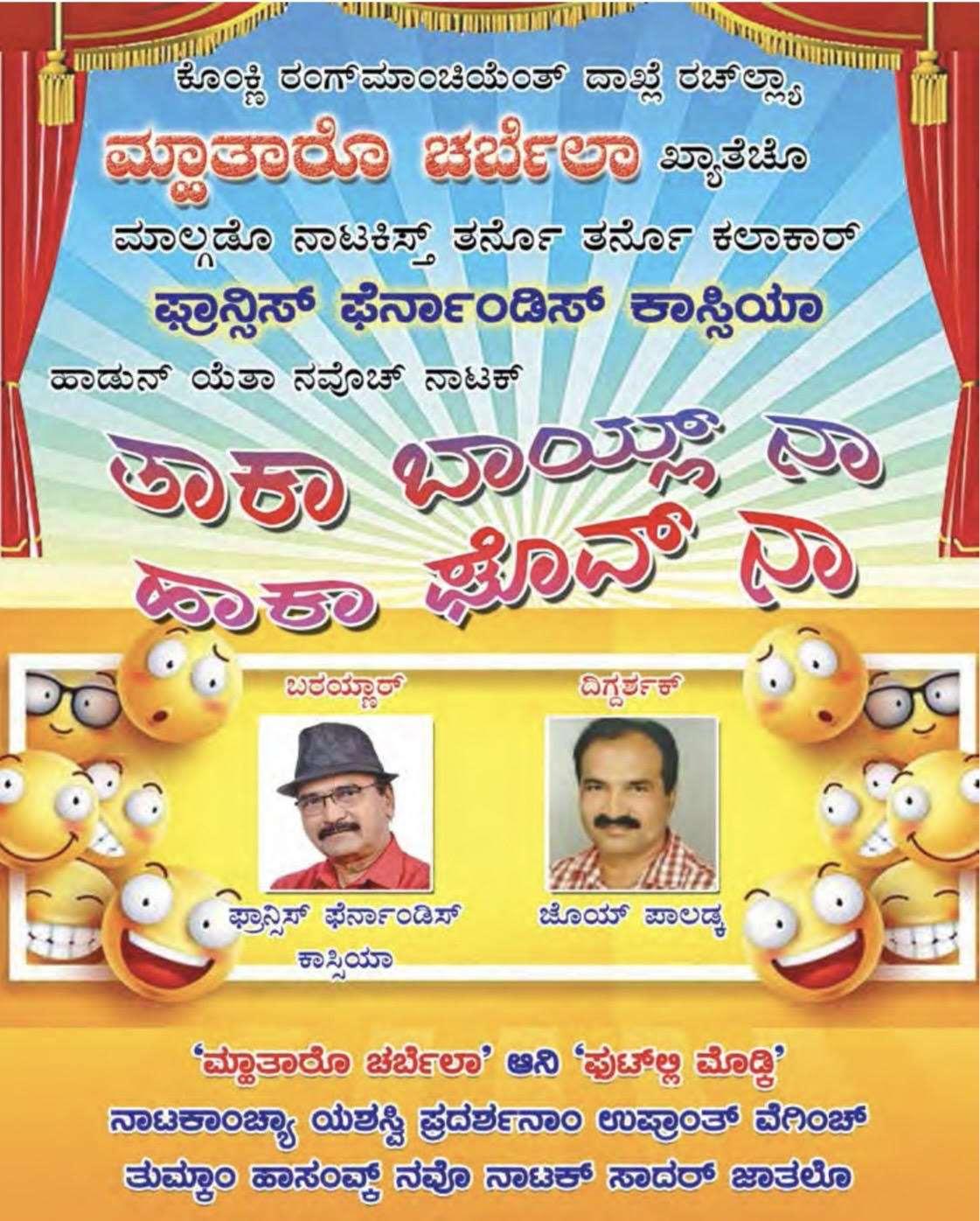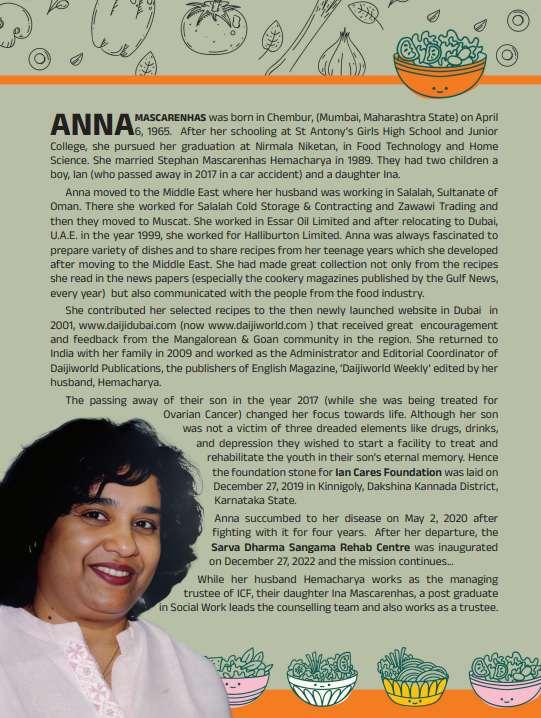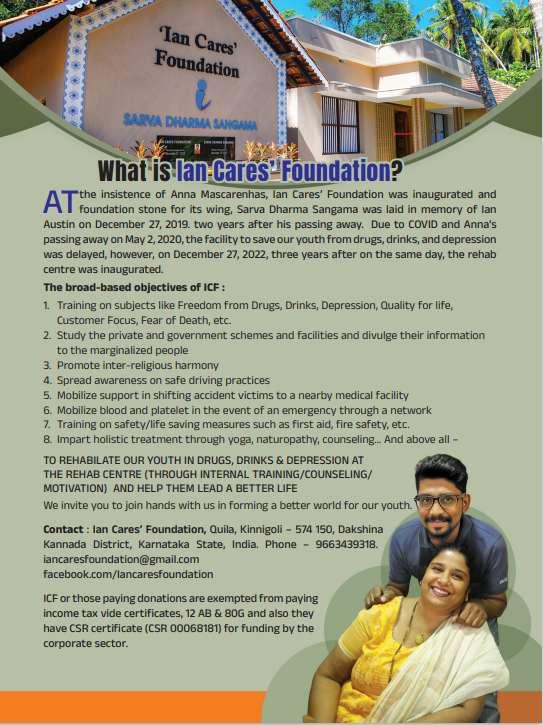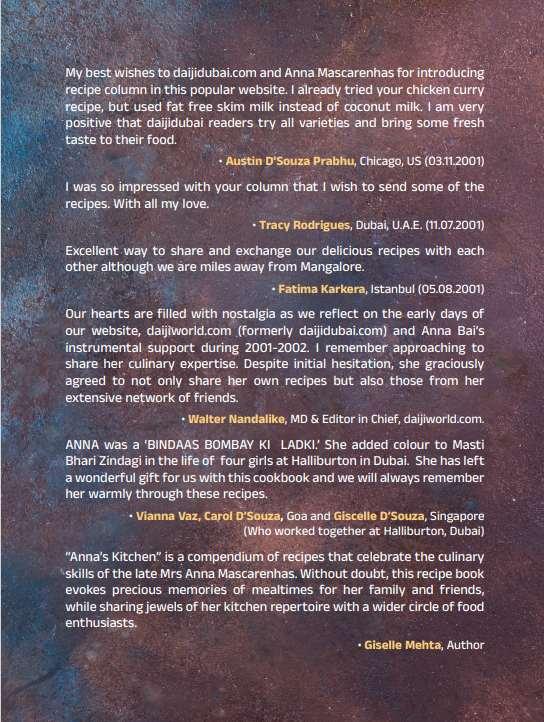
































































































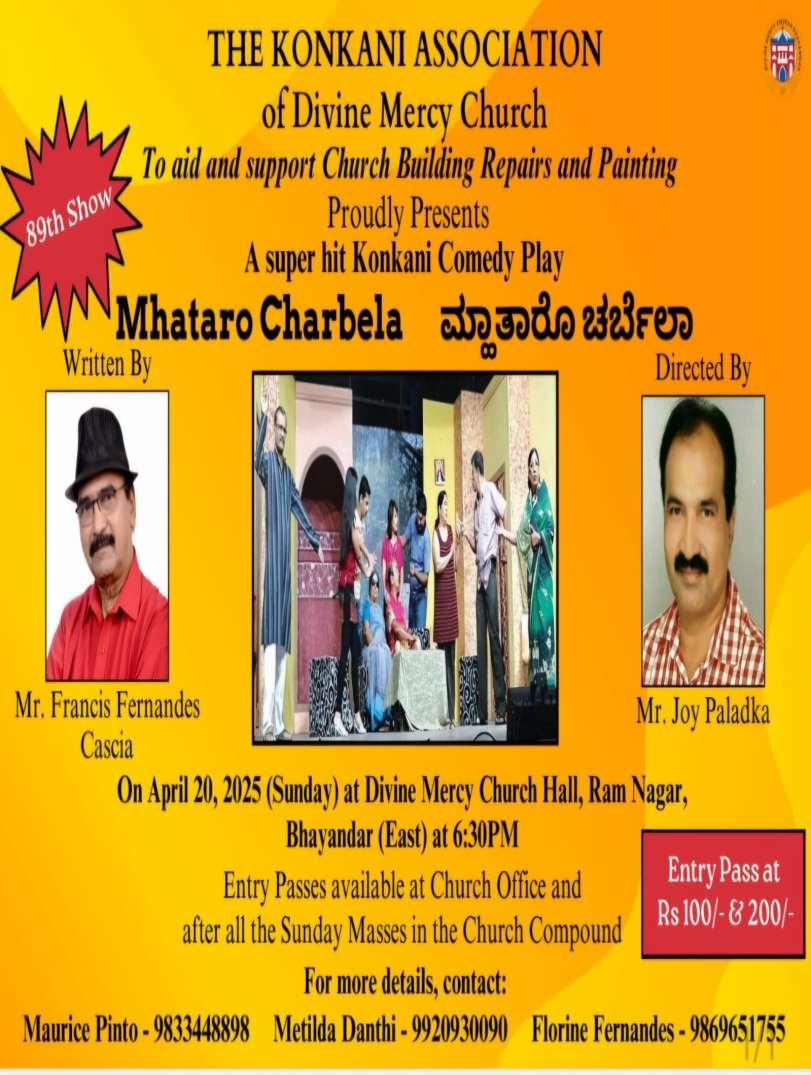


















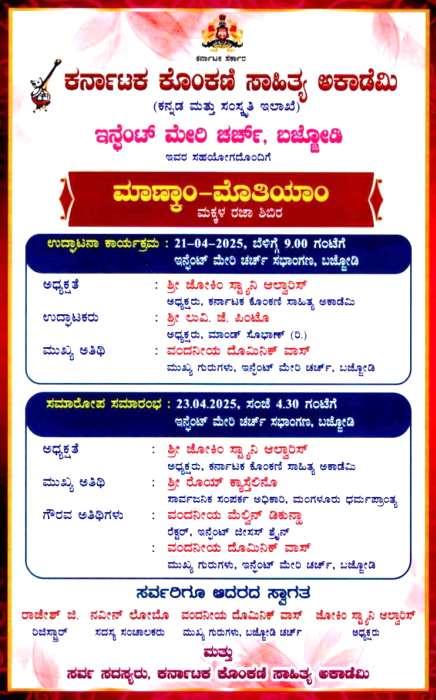




































































































































































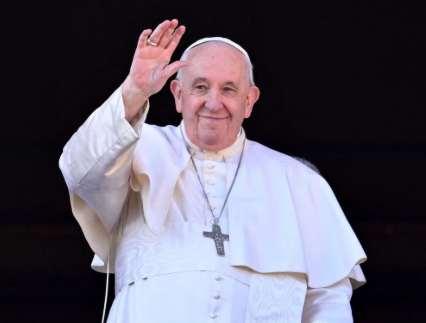
In the death of Pope Francis, the world has lost one of the greatest personalities of modern times! We aresaddenedthatheisnolongerin ourmidst!
He was truly a compassionate pastor with a warm, loving heart for the poor and marginalised, the excluded and the exploited, the refugees and the migrants, the LGBTGIA+ community, the victims of war and humantrafficking and in fact, with all sub-alterns and those
who live on the peripheries of society.
Pope Francis transcended boundaries and exclusiveness, divisions and discrimination of every kind. He was convinced that humans should build bridges and not walls, to reach out to others, particularlythelost,the lastandthe least. His Encyclical ‘Fratelli Tutti’ speaks strongly about this.
Pope Francis was deeply troubled by what is happening to the environment. He cared for our common home and wished that all take responsibility to ensure that our planet earth is liveable for all. His writings ‘Laudato Si’ and ‘Laudate Deum’ on the environment, bear testimony to his concern.
Pope Francis was a man of peace! He spoke out unequivocally against every war and the industrial military complex; he took a strong stand against the ‘culture of death’. He spoke directly to the most powerful people on earth reminding them of what they should be doing. His last tweet on 20 April evening began with “Iwouldlikeustorenewour hopethatpeaceispossible…”
Above all, Pope Francis was a man of God, sent to be a pilgrim on earth; to motivate all of us with a newer, deeper and more meaningful hope! He was a complete human being who left no stoneunturnedtomakeourworlda more just, peaceful and humane place for all! He wasandisa SAINT!
Millions all over will miss him! In his deaththe world isorphaned!
Fr. Cedric Prakash SJ 21 April 2025
Fr.Cedric PrakashSJ
Mobile: +91 9824034536
Email: cedricprakash@gmail.com
Skype:cprakashsj Twitter:@CedricPr akash
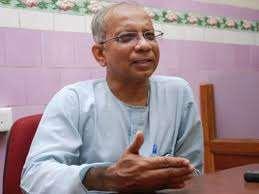
*(Fr. Cedric Prakash SJ is a human right, justice, reconciliation & peace activist/writer)






Francis was a deeply religious child in Buenos Aires. The first pontiff from Latin America tried to create a more welcoming church.
• Share fullarticle
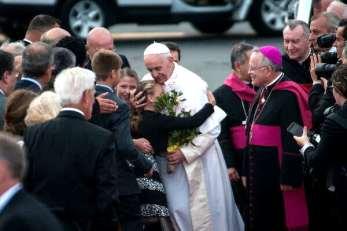
Pope Francis became head of the Catholic church in 2013 after Pope Benedict XVI stepped down. Credit...Gabriella Demczuk for The New York Times
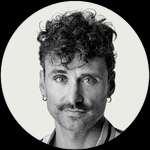
By Jonathan Wolfe
• April 21,2025Updated 6:56 a.m. ET Pope Francis’ life took him from a modest upbringing in Buenos Aires to lead the Roman Catholic Church asthefirstJesuitpontiffandthefirst from Latin America.
Across his 12 years as pope, Francis consistently elevated the caused of migrants and the disenfranchised, and pushed the church to more forcefullyconfrontitsownhistoryof scandal. His efforts to make the church more inclusive were welcomed by his supporters and many Catholics, but some conservatives pushed back as he veeredfrom traditional teachings. 1936
Pope Francis was born Jorge Mario Bergoglio on Dec. 17, 1936, in Buenos Aires. His parents were immigrants from Italy, and he was the eldest of five siblings. As a boy, he was intelligent, deeply religious and loved to dance the tango.

A young Jorge Mario Bergoglio in an undated photograph.
Credit...Jesuit General Curia, via Getty Images
1952
Religious Calling
When he was 16, Jorge was rushing to meet friends but paused at the Basilica of St. Joseph in Buenos Aires,feelinganurgetogoinside.In the sanctuary, it felt as though “someonegrabbedmefrominside,” he said, adding, “Right there I knew I had to be a priest.” He later joined a seminary.
1969
Ordination
After 13 years of study, Jorge Mario Bergoglio wasordained as a priest.

Jorge Mario Bergoglio, standing second from left, with his family.
Credit...API/Gamma-Rapho, via Getty Images
1973
A Jesuit Leader
Father Bergoglio became the head of the Jesuits, an order of priests, in Argentina. At the time, the country was in the throes of a “dirty war,”
when the ruling military junta tortured, killed or “disappeared” as many as 30,000 people. Father Bergoglio later faced accusations that he had done little to protect two priests with antigovernment views who were kidnapped and tortured by the regime. He has denied the claims, saying he protected priests and others by pressingmilitaryofficialsbehindthe scenes.
FatherBergoglio’stenureasheadof the Jesuits ended in controversy, with critics accusing him of having an autocratic management style. Church authorities sent him into de facto exile in Frankfurt, Germany, and then to Córdoba, Argentina.
Father Bergoglio’s exile was interrupted when he was unexpectedly named an auxiliary bishop of the Buenos Aires diocese. He became an archbishop six years laterandfocusedonoutreachtothe poor.He waselevatedto cardinal in
2001.
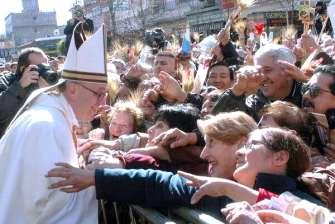
Cardinal Bergoglio greeting parishioners in Buenos Aires.
Credit...Claudia Conteris/Agence France-Presse — Getty Images
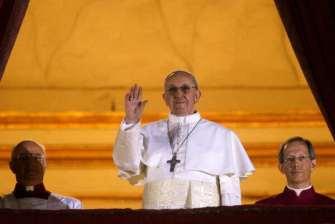
Francis was elected pontiff after Pope Benedict XVI resigned, citing health concerns. Francis tried to move the church awayfrom divisive issues such as abortion and homosexuality, instead focusing on climate change, poverty and migration. His first papal trip was
to Lampedusa, an Italian island that had become a beacon forasylum seekers and migrants.
Pope Francis waving to the crowds in front of St. Peter’s Basilica minutes after his election in 2013.Credit...Gregorio Borgia/Associated Press
2014
AddressingSex Abuse
Francisestablishedacommissionto address the church’s clerical sexualabuse scandals. It included victims of abuse and sought to hold bishops accountable, but the effort eventually fell apart.
Takethem back – April26
Do your part to lower overdoses and prevent prescription drug misuse before it starts.
2014
U.S.-CubaAgreement
The United States and Cuba restoreddiplomaticrelationsforthe first time in decades. Francis was credited with helping bridge the divide between President Obama and President Raúl Castro of Cuba, leading to the historic breakthrough.
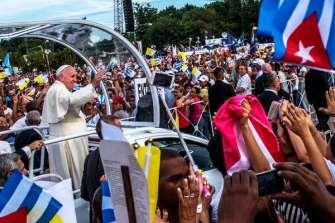
Pope Francis visiting Cuba in 2015 after he helped the United States and Cuba to restore diplomatic relations.
Credit...Daniel Berehulak for The New York Times
Francis released “Laudato Si,” the first papal encyclical focused solely on the environment. It called for protecting the environment and denounced the excesses of global capitalism in exploiting the poor.
During a six-day trip to the United States, Francis became the first pope to address Congress.
Pope Francisaddressing Congress
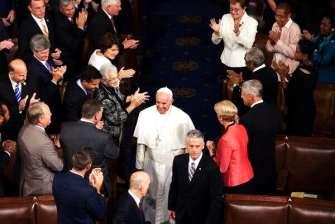
in 2015, becoming the first pontiff to do so.Credit...Zach Gibson/The New York Times
Francis repeatedly sought to stand up to nationalism. During the U.S. presidential election, he suggested that Donald J. Trump, the Republican candidate, was “not Christian”becauseofhispreference for building walls rather than bridges. Mr. Trumpresponded: “For a religious leader to question a person’s faith is disgraceful. I am proud to be a Christian.”
Francis sought closer relations with other religions, especially in places where Catholics were at risk of persecution. At a conference in Cairo, he denounced “demagogic
forms of populism” and violence masquerading as piety.
Image
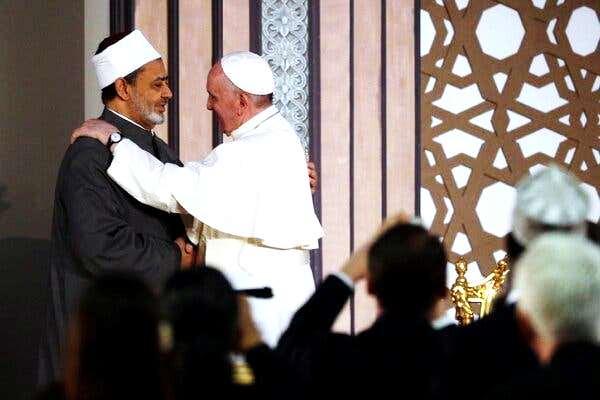
Pope Francis meeting Sheikh Ahmedel-Tayeb,thegrandimamof Al-Azhar, in Cairo, Egypt, as part of an effort to improve relations with other religious leaders.
Credit...Gregorio Borgia/Associated Press
Francis reached a provisional agreement with the Chinese government to end a decades-long power struggle over the right to appoint bishops in the country. The deal gave the church greater access
to China, but also legitimized seven bishopsappointedbyBeijing,which critics said set a dangerous precedent.
Francis issued the church’s most comprehensiveresponseindecades to the sexual abuse crisis. It obligatedchurchofficialsworldwide toreport casesof sexual abuse, and efforts to cover them up, to their superiors. But it did not require officials to report abuse to the police, an omission that enraged victims.
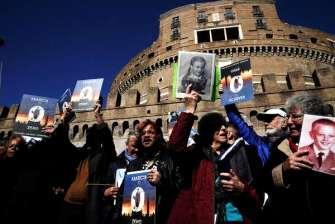
Sex abuse survivors marching in Rome as Pope Francis hosted a four-day summit on preventing clergy sexual abuse, in 2019.Credit...Alessandra Tarantino/Associated Press
A meeting of bishops from the Amazon region recommended that Francis allow the ordination of married men as priests in remote areasofSouthAmerica.Hesignaled an openness to the idea but ultimately set aside the proposal.
On Good Friday, from a dark, deserted St. Peter’s Square, Francis delivered a blessing and called for solidarity around the world to confront the coronavirus pandemic. At the time, Italy was in lockdown amida deadly wave of the virus.
Pope Francis celebrating Good Friday during the pandemic in a near-emptySt.Peter’sSquareatthe Vatican in 2020.Credit...Nadia Shira Cohen for The New York Times
2022
During a visit to Canada, Francis begged for forgiveness from the country’sIndigenouspeople forthe “evil” inflicted upon them by Christians. He also apologized for
the church’s role in running residential schools where Indigenous children were abused and many died.
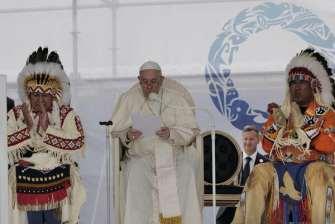
Pope Francis at a meeting with Indigenous leaders over the church’s role in running boarding schools where children were abused. Credit...Ian Willms for The New York Times 2023
An Effort toIncludeWomen
Francis for the first time held a meeting of world bishops that included women and lay people as voting members. The synod, as the meeting is known, broached some of the most sensitive topics in the church, including the role of
women, celibacy and the marital statusofpriests,butitdidn’tchange those policies. After the meeting, Francis allowed priests to bless gay couples.
2025
FrancisdiedonMondayat7:35a.m., less than a day after blessing the faithful who had gathered for an EasterMassinSt.Peter’sSquare.He appeared on a balcony on Sunday, looking frail, and after blessing the crowd,hedeferredtoaVaticanaide toaddress the crowd on his behalf. Francis had wrestled serious health issues in the preceding months, including a severe respiratory infection that had sent him to the hospital for weeks.
He leaves a legacy of inclusion and activism, having often spoken in support of migrants, the marginalized and the environment. Ali Watkins contributedreporting.
JonathanWolfe isaTimesreporter basedinLondon,coveringbreaking news.





Pope Francis died on Easter Monday, April 21, 2025, at the age of 88 at his residence in the Vatican's CasaSanta Marta.
By Devin Watkins
At 9:45 AM, Cardinal Kevin Farrell, Camerlengo of the Holy Roman Church, announced the death of Pope Francis from the Casa Santa Marta with these words: "Dearest brothers and sisters, with deep sorrow I must announce the death of our Holy Father Francis. At 7:35 this morning, the Bishop of Rome, Francis, returned to the house of the Father. His entire life was dedicated to the service of the Lord and of His Church. He taught us to live the values of the Gospel with fidelity, courage, and universal
love, especially in favor of the poorest and most marginalized. With immense gratitude for his example as a true disciple of the LordJesus,wecommendthesoulof Pope Francis to the infinite merciful love of the One and Triune God."
The Director of the Holy See Press Office,MatteoBruni,toldjournalists later Monday that the late Pope's body could be transferred to St. Peter's Basilica on Wednesday morning, so that the faithful may pray before his mortal remains.
"ThetranslationoftheHolyFather's mortal remains to the Vatican Basilica, for the veneration of all the faithful, may take place on the morning of Wednesday, April 23, 2025, according to the
arrangements that shall be determined and communicated tomorrow, following the first Congregation of the Cardinals," Mr. Bruni said.
The Pope was admitted to the AgostinoGemelliPolyclinicHospital on Friday, February 14, 2025, after suffering from a bout of bronchitis forseveral days.
Pope Francis’ clinical situation graduallyworsened,andhisdoctors diagnosed bilateral pneumonia on Tuesday,February18.
After 38 days in hospital, the late Pope returned to his Vatican residenceattheCasaSantaMartato continue his recovery.
Pope Francis’ pontificate of peace, for peace
In1957,inhisearly20s,JorgeMario Bergoglio underwent surgery in his native Argentina to remove a portion of his lung that had been affected by a severe respiratory infection.
As he aged, Pope Francis frequently suffered bouts of respiratory illnesses, even cancelling a planned visit to the United Arab Emirates in November 2023 due to influenza and lung inflammation.
In April 2024, the late Pope Francis approvedanupdatededitionof the liturgical book for papal funeral rites, which will guide the funeral Mass which has yet to be
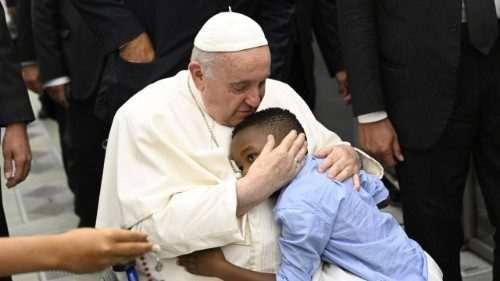
21/04/2025
ThePope ofMercy
21/04/2025
The second edition of the Ordo Exsequiarum Romani introduces several new elements, including how the Pope’s mortal remains are to be handled
The ascertainment of death takes place in the chapel, rather than in the room where he died, and his body is immediately placed inside the coffin.
According to Archbishop Diego Ravelli, Master of Apostolic Ceremonies, the late Pope Francis had requested that the funeral rites be simplified and focused on expressingthefaithoftheChurchin the Risen Body of Christ.
“The renewed rite,” said Archbishop Ravelli, “seeks to emphasise even more that the funeral of the Roman Pontiff is that of a pastor and disciple of Christ and not of a powerful personofthisworld.”


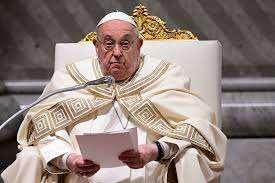
Pope Francis, born Jorge Mario BergoglioonDecember17,1936,in Buenos Aires, Argentina, is the first pope from the Americas, the first fromtheSouthernHemisphere,and thefirstnon-Europeanpopeinover 1,200 years. His parents, Mario José Bergoglio and Regina María Sívori, were Italian immigrants who
instilled in him a strong sense of faith and devotion. Growing up in the vibrant and culturally diverse neighborhood of Flores, young Jorge developed a love for soccer anddancing, particularlythetango.
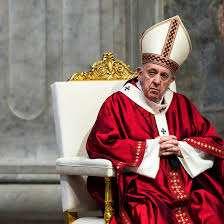
Jorge Bergoglio's journey to priesthood began when he was a teenager. At the age of 17, he had a profound spiritual experience duringconfession,whichsethimon thepathtoreligiouslife.Heentered the Society of Jesus, commonly known as the Jesuits, in 1958. After completing his novitiate and studying humanities in Chile, he returned to Argentina to continue his studies in philosophy and theology. His ordination as a priest took place on December13,1969.
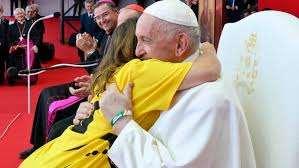
Following his ordination, Father Bergoglio dedicated himself to academic and pastoral work. He taught literature and psychology at the Colegio de la Inmaculada Concepción, a Jesuit high school in Santa Fe, and at the Colegio del Salvador in Buenos Aires. His intellectual rigor and deep compassion for his students made him a beloved teacher. He also pursued advanced theological studies in Spain, further enriching hisunderstandingofthefaith. Leadership within the Jesuit Order
In 1973, Father Bergoglio was appointedprovincialsuperiorofthe Jesuits in Argentina. This role required him to navigate the complex and often dangerous
political landscape of Argentina during the period known as the "Dirty War." Despite the risks, he worked tirelessly to protect the vulnerable and advocate for human rights.Hisleadershipwasmarkedby humility, a commitment to social justice, anda deep spirituality.

Pope John Paul II appointed Bergoglio as the Auxiliary Bishop of Buenos Aires in 1992, and he was consecratedonJune27ofthesame year. He quickly rose through the ranks, becoming the coadjutor archbishop in 1997 and the archbishop in 1998. As Archbishop of Buenos Aires, he was known for his simple lifestyle, often taking public transportation and livingin a modest apartment rather than the archbishop's palace. His focus on pastoral care, social justice, and
outreach to the marginalized definedhistenure.
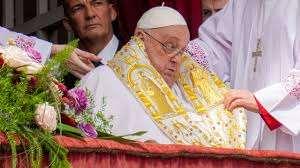
In 2001, Pope John Paul II elevated Archbishop Bergoglio to the College of Cardinals. Cardinal Bergoglio continued his efforts to addresssocialissues,advocatingfor the poor and underserved communities. He became a prominent voice within the global Catholic Church, respected for his theological insight, pastoral sensitivity, and commitment to the Gospel'ssocialteachings.
The resignation of Pope Benedict XVI in 2013 marked a historic momentintheCatholicChurch,asit was the first papal resignation in nearly 600 years. The conclave that followedbroughttogethercardinals from around the world to elect a
newpope.OnMarch13,2013,Jorge Mario Bergoglio was elected as the 266th pope of the Roman Catholic Church. He chose the papal name Francis, in honor of Saint Francis of Assisi, reflecting his commitment to poverty, humility, and care for creation.
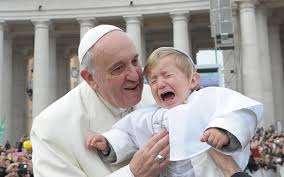
Pope Francis' papacy has been characterized by a renewed emphasis on mercy, simplicity, and inclusivity. He has sought to bring the Church closer to the people, emphasizing pastoral care over doctrinal rigidity. His encyclicals, such as "Laudato Si'" on the environment and "Fratelli Tutti" on fraternity and social friendship, addresscontemporaryglobalissues with a call for dialogue, solidarity, andrespectforhumandignity.
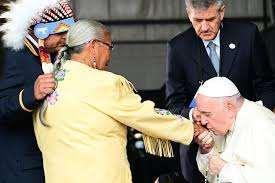
Pope Francis has been a vocal advocate for social justice, economic equity, and the rights of migrants and refugees. He has consistently highlighted the plight of the poor and marginalized, urging the global community to take action against systemic injustices. Hisvisitsto impoverished and conflict-ridden areas, including theCentralAfricanRepublicandthe GreekislandofLesbos,demonstrate his commitment to being a "shepherd with the smell of the sheep."
From the beginning of his papacy, Pope Francis has been dedicated to reforming the Vatican's bureaucracy and addressing issues of clerical abuse. He established the Pontifical
Commission for the Protection of Minors and has taken steps to hold accountable those who have covered up abuse. His efforts to promote transparency and accountability within the Church reflect his commitment to restoring trustandintegrity.
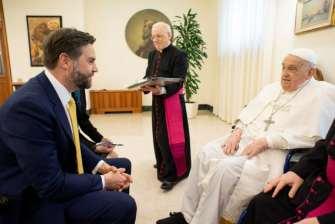
Lastpoliticianto meet USVPVance
InterfaithDialogue
Pope Francis has made significant strides in promoting interfaith dialogueandfosteringrelationships with other religious traditions. His meetings with leaders of various faiths, including Islam, Judaism, and Orthodox Christianity, emphasize the importance of mutual respect and collaboration in addressing global challenges. The Document on Human Fraternity for World Peace and Living Together, signed
with the Grand Imam of Al-Azhar in 2019, is a landmark declaration of interreligioussolidarity.
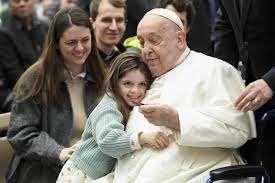
Despite the demands of his role, Pope Francis maintains a deep personal spirituality characterized by prayer, humility, and a sense of humor. He often speaks of the importance of joy in the Christian life and encourages the faithful to livewithasenseofhopeandtrustin God'sprovidence.
As Pope Francis continues to lead the Catholic Church, his legacy is still being written. However, his emphasis on mercy, his outreach to the peripheries, and his call for a more inclusive and compassionate Churchhavealreadyleftaprofound impact.Heremainsatransformative
figure, challenging both the Church andtheworldtoembracethevalues of the Gospel in a spirit of love and service.
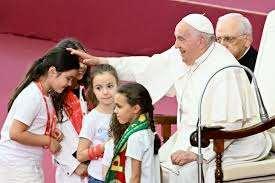
Pope Francis' life, from his humble
beginnings in Buenos Aires to his role as a global religious leader, is a testament to his unwavering faith and dedication to the principles of justice, mercy, and humility. His papacycontinuestoinspiremillions, offering a vision of a Church that is both deeply rooted in tradition and dynamically engaged with the contemporaryworld.

In the heart of Rome, where history breathes, A figure stands with grace, his message seethes, Pope Francis, humble and wise, A beacon of hope beneath the skies. With gentle words, he calls for peace, For every soul, he seeks release, From chains of hatred, fear, and pain, He walks the path of love, not in vain. A shepherd to the flock, he tends, A friend to all, his hand extends, With open arms, he welcomes all, No one's too great, no one's too small. In times of strife, he speaks of care, For the world's poor, he’s always there, A voice for justice, truth, and right,

A guiding star in the darkest night. With every step, he shows the way, To live with kindness every day, Pope Francis, in his robes of white, Embodies the world’s quest for light. From distant lands, his influence reaches, Across the globe, his wisdom teaches, A legacy of love, he leaves behind, A testament to the power of a kind mind. So, here’s to Francis, a man so rare, With tender heart and fervent prayer, May his journey long inspire, A world united, hearts afire. Generated by AI Copilot


PopeFrancissendsavideomessage to social justice judges of the American and African continents and urges them to base their material reshaping of social justice on six fundamental points.
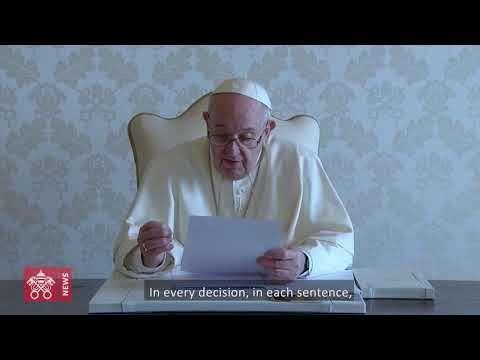
By Vatican News staffwriter Inhisvideomessagetosocialrights judges
of Africa and America, Pope Francis notes that to build on and
analysetheideaofsocialjustice, we mustfirstturntothefoundationson which it should be based. There are six, he says.
The first has to do with the dimensionofreality,hebegins.“The ideas on which you will surely work, should not lose sight of the distressing picture in which a small part of humanity lives in opulence, while to an increasing number of people their dignity is unknown, and their human rights are ignored andviolated.”
30/11/2020
to social rights judges: justice is truly just when it makes peoplehappy
The second, he continues, reminds usofhowjusticeisgenerated.“Iam thinking of a collective work, an ensemble work, where everyone and all well-meaning people challenge utopia and admit that, like good and love, the just is a task that must be conquered every day, because imbalance is a temptation at every moment.” For this reason, headds, “everydayisa conquest”. Commitment
The third is that we should remember to "commit" to shaping and uniting this new social justice, says the Pope. We must recognise that "temptation” is so frequent to disinterest in others, especially the weakest. The unconditional commitment is to take on the pain of the other, and not to slip into a culture of indifference, he explains.
The fourth and "obligatory" reflection, continues the Pope, is “the idea of history as a guiding axis”: add the perspective of the past to the approach, he says. “In thepasttherearealltherootsofthe experiences, even those of social justice that today we want to rethink, growand strengthen."
Thefifthisthepeople,continuesthe Pope.Historyleadsustothepeople. “StartingfromtheGospel,whatGod asks of us believers is to be God's people, not God's elite. Because thosewhofollowthepathof"God's elite" end up in the well-known elitist clericalisms that work for the people, but do nothing with the people, donot feellike apeople.”
And finally, says the Pope: “Solidarity”. "Fighting against the structural causes of poverty, inequality, lack of work, land and housing.Land,roofandwork,techo, tierra y trabajo, the three "T's" that make us worthy." Struggling, in short,againstthosewhodenysocial and labour rights. Struggling against that culture that leads to using others, to enslave others and ends up taking away the dignity of others.Donotforgetthatsolidarity, understoodinitsdeepestsense,isa way of making history, says Pope Francis.
Pope Francis concludes his video message by noting that “righteous are those who do justice. Righteously, knowing that, when, resorting to law, we give the poor what is essential, we do not give them our belongings, nor those of thirdparties,butwegivethemback what istheirs.”
Finally, Pope Francis wishes the judgesanexcellentdayofreflection and prays that all they build will be “morethana meretheory”.
(Source: Internet)


apoem
ByMetaAI

A poeticlogicthatshapes his universe. Hebelieves in humanity's gentlemight, Andadvocates for peace, day andnight. Withcompassionandcare,he tends toflock, A holymanwitha heart ofgold. His words inspire,his actions ignite, A beaconofhopein thedarkofnight.
Let's prayfor Pope Francis, aguidinglight, May his serviceto the Churchshinebright. May his words anddeedsbringuscloser tothee, Andmay his heart remain filledwithloveandglee.


















